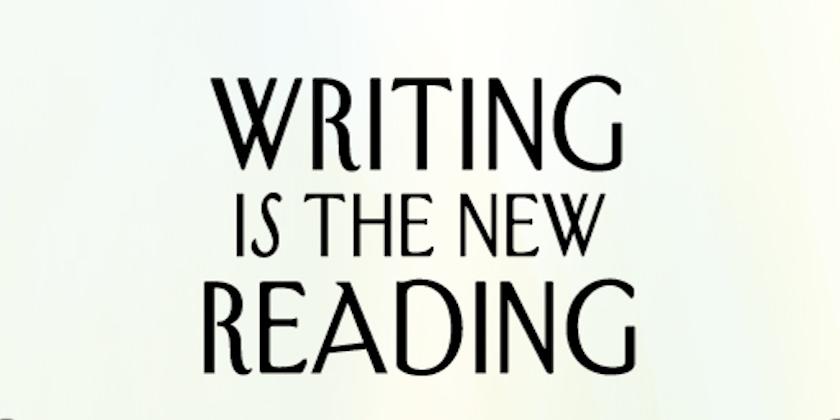Probably not. And knowing that is such a relief. For once, being vain helps, and that ego will save the day. But writers who were metaphorically biking and trying not to crash, you can go home. Your story ends here. I have nothing reassuring to say. AI will replace you. You could still write for the pleasure of the process, but the outcome will keep diminishing your spirit, given that the AI writer will be so perfect in comparison.

But you are relentless. You have an ego, the one beyond self-esteem and self-awareness. You have a purpose. You don’t want to just tell a story. You want to tell that you are a writer. Yes, You fell. But you stood back up. You grew. You felt embarrassed by the mediocrity of your past writings. You trained. How? You built, designed, reprogrammed, and neatly labeled your material – your human experiences, the sensory information, your interpretations of the world around you. You took complete control of your thoughts in response to the prompts from your random life. You went back, retracing the same steps through which we built the AI. You even trained yourself to write tricky prompts. Just to spite that AI writer. Because you can’t wait to kick its ass. You are the writer, the culmination of everything you are, and all that is between the conscious and the unconscious.
Our theme is “Human writing in the age of AI’
In this issue, we have explored our hubris as a platform for creative thinkers and writers, an exercise, although not entirely but significantly, triggered by the fashionably low-key but eventually flamboyant arrival of ChatGPT at the tail end of 2022. What a showoff of a contraption. And even before the bots, the burgeoning content platforms had already started to look shallow and shaky. We called it the Gentrification of Writing!
In the essay ‘AI wrote for me, and I am bored,’ the author amuses herself during a weekend afternoon as she teases different AI writing tools with random prompts. She even competes with the AI writer over the same prompt. Read to find the results.
The essay ‘Hey Google! – Writing for Your Attention’ would undoubtedly be the perfect SEO essay with high utility value for the reader, listing tips and ideas about how to reconcile the conflict of fulfilling Google’s everchanging wishes while remaining an authentic creative writer. Handing out the rituals of SEO worshipping, the writer almost accidentally treads into the existential crisis of creativity in the face of AI tools. Quoting Mark Twain, ‘There is no such thing as a new idea…We simply take a lot of old ideas and put them into a sort of mental kaleidoscope’; the writer confirms the exact reason why AI could replace our jobs, which is giving Mark Twain’s kaleidoscopes a turn and keep making new and curious combinations.
Through the ages we keep turning and making new combinations of old over used colored glasses indefinitely. AI tools could do all this turning of ideas at lightning speed. Just when this realization was about to trigger a strange foreboding inside our creative organs, we stumbled upon yet another future possibility – the futility and consequent dismissal of SEO altogether. As you read, you will find that the essay, however, remains sincere and delivers what it promises – How to keep writing and getting searched and found ONLINE till the future changes.
Our third essay, ‘Reading would be the true antithesis of AI writing,‘ sums up various observations and arguments like an epilogue to this theme on ‘Human writing in the age of AI.’ The essay claims reading to be a performative experience that demands a climax attainable only through the dialectics activated by human writers. Read to find out if AI tools would ever argue or try to make a point.
Why Writer's Ego Matters
Now, returning to our opening question, would AI have an ego, and why does it matter? So far, we see that the AI writers are sharp, wisecracking smooth talkers. Sometimes they send a chill down our spine with unexpected human-like empathy, even faking human imperfections. The showing off with all the speed and rush is starting to get a bit annoying.
We need to worry about the areas where the overlap between the Human and AI keeps growing. For example, human writers could imitate and fake writing styles. The essence of being a writer (whatever constitutes that essence) can be craftily staged by a human writer. Such writers wouldn’t probably feel accountable for the expositions in their writings. Before we know it, human writers have already morphed into machines and have let their egos slide. There is no distinguishable difference left between the AI writer and the human. The AI writer in that situation has more to offer, more promises fulfilled than the human writer, who has found peace in their complacency.
The writer’s ego in feeling special, in their desire to be exceptional, in their conviction of writing the best book ever written, in their crisis and self-doubt, in their agency to argue or make unpopular claims, render their work the value of unique authenticity.
We are building these AI tools and getting a village to raise them so that our children learn to have better output from their future endeavors. I can almost hear the previous sentence in David Attenborough’s (the AI tool spell-checked ‘Attenborough’) voice in my head. And while we allow these baby machines to grow out from our metaphorical villages of endless human knowledge and information, let us ensure we don’t irresponsibly enable them to crawl on publicly accessible but copyrighted material. Our parents, after all, did not raise us on stolen resources.
Human Nonsense is our only hope
We could go to great lengths to differentiate ourselves from AI writers, apart from, of course, setting off the AI bot detectors themselves (we never fail to instigate them against their own). We could turn writing into a performance – watching a writer write with all the theatrics of a stage or record the writer while they write and live stream it—a whole new genre for binge-watching on the OTTs.
Writing is not improv. And even before that idea crosses our mind, it’s best to know that the AI writer has already nailed it as an improv writer. So in the nonsense we write about our very original blabbering, idiosyncrasies, unfounded fears, dumb neologisms, stupid interpretations, and child-like comebacks, we will keep upping the game for our AI counterparts. As Daily Lifers (right here, we are making that an official global movement), as long as we keep writing about the nothings of our lives, we are good. We don’t fully understand the nothings we do in a day, that space (the blackbox) between the conscious and unconscious, the ego. We don’t know how to face it, comprehend it and control it. We simply device ways to channelize it, through art, expressions and so on. How or why would we set up machines to face such a predicament! (Again, just to spite them? Not cool anymore).
Unless watching an artist (painter, writer, musician, and so on) think is going to be the new trend, let us safe keep the big part of our lives that is interior, accessible only to our individual consciousness.
Written by: Esha Sen Madhavan
[Founder Editor, The Daily Life Magazine]
Graphics/Art/Illustration by: TDLM Design Team
‘Would ChatGPT have an Ego?’ First Published in The Daily Life Magazine on February 17, 2023











 Report This
Report This
Leave a Reply
You must be logged in to post a comment.